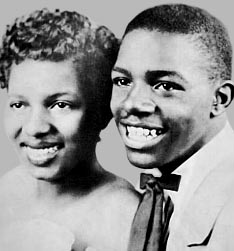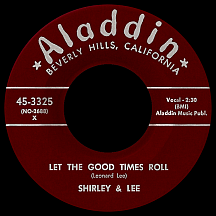SHIRLEY AND LEE
Let the Good Times Roll
It took some time for the music world to figure out Cosimo Matassa's tiny studio in New Orleans (J&M, named for jukebox operator Joe Mancuso, an associate of Cosimo's father, John Matassa) was one of the best places to get outstanding results on record...anywhere. Yet to circa 1952 teenagers who lived in the area it was, more importantly, a place where if you loitered outside often enough, you might get to say "Hey" to Roy Brown, Fats Domino or a number of other well-known artists who made magic within its walls. 16-year-olds Leonard Lee and Shirley Goodman, both of them born in June 1936, were among those star-struck teens. They'd been bugging Cosimo about letting them make a demonstration record and he finally agreed to do it for two bucks. They scrounged up the money and he kept his word, pressing the "record" button on his Ampex tape machine while the youthfully determined duo warbled "I'm Gone," a song they had written.
Eddie Meisner, top dog in the family operation called Aladdin Records, a Los Angeles label, frequently made the cross-country trek to Cosimo's in his search for talent; a few seconds spent listening to Leonard and Shirley's tape and Eddie was sold on the back-and-forth vocal approach and Shirley's high, shrill-but-sweet voice. He had to find those kids! So Cosimo made some inquiries around the neighborhood. After it was redone with producer Dave Bartholomew (Fats' main man) and the Big Easy's hottest musicians, "I'm Gone" hit the national rhythm and blues charts in short order, climbing as high as number two in January 1953. The flip, "Sweethearts," every bit as smooth as the hit side, supplied their nickname, "The Sweethearts of the Blues," despite the lack of any real-life romantic involvement. The second Aladdin single, "Baby," was a slow-to-midtempo romantic song like the first in what became a series of love songs...often juicy ones.
Meisner had Leonard Lee do a solo disc, "Tryin' to Fool Me," the first offering on the label's Lamp imprint, while Shirley and Lee anticipated the possiblity of another top seller. 1954's suggestively raucous "Keep On," a contribution from composers Rosemary McCoy and Charles Singleton, indicated the teenaged faux-fondlers were moving away from ballads as a feelgood party mindset seeped into the songs Lee, who created most of the duo's output, was coming up with. In 1955, "Feel So Good" made a strong impact at radio in time to play a key role in spreading the awareness of the emerging rock and roll movement and its priorities (as evidenced by untoward lines like 'Come let me hug ya, come let me kiss ya, come let me see what I've been missin'!'). Lighter numbers like "Lee's Dream" and "That's What I'll Do" were tightly produced by Bartholomew but lacked the provocativeness that listeners were beginning to expect from the almost-out-of-their-teens twosome.
The band present at many of Matassa's recordings of stars from Domino to Lloyd Price to Smiley Lewis included a triple-threat team of saxophonists (Lee Allen, Herb Hardesty and Alvin "Red" Tyler) who added extra "zip" to the proceedings, a quality the next Shirley and Lee single possessed...in spades. "Let the Good Times Roll," one of the better-known (and most-remade) of Louis Jordan's many hits, was already well established as a '....you only live but once and when you're dead you're gone' excuse to get loose. In 1956, a decade after Jordan had solicited his opinion, Shirley and Lee took a get-busy 'Rock me all night long' approach, taking Lee's "Let the Good Times Roll" to the peak of the late summer R&B charts and into the pop top 40, landing it right in the center of other early rock classics with unapologetically immodest content like Joe Turner's "Shake, Rattle and Roll," Little Richard's "Tutti-Frutti" and "Whole Lot of Shakin' Going On" by Jerry Lee Lewis.
"I Feel Good" put a less lascivious spin on the desires expressed in "Feel So Good," going top ten R&B and top 40 pop near year's end. Shirley and Lee had a one-in-three success rate in their four years of making records for Aladdin; "When I Saw You" glimpsed a little action in early '57, but the duo fell into an unwavering party/hook-up mode over the next two years: "Rock All Nite," "I'll Thrill You," "Everybody's Rockin'," "Come on and Have Your Fun" and other tunes grew tiring...and stopped selling. The on-record-only lovebirds went over to Morty Kraft's Warwick Records in 1960 and scored a few minor hits, foremost among them "I've Been Loved Before," written by Lee as most of the earlier efforts, but with a sensitivity taken to the next level and a rare maneuver, for them, near the end of the song: a couple of lines were sung in unison!
A reworked "Let the Good Times Roll" made a top 50 showing in the fall of 1960 and the spunky summer '61 "Well-A, Well-A" (composed by bassman Arthur Crier of "Nag" group The Halos) found them in a new comfort zone with unison vocals throughout most of the song, an approach they began taking more often. Lee moonlighted for 7 Arts Records with "Call Me a Fool," featuring backing provided by the Halos, who were on the same label. Meanwhile, Aladdin had been sold to Imperial Records and Shirley and Lee signed with the label, once again working with producer Dave Bartholomew. "The Joker" kicked off six S&L singles plus one solo 45 for Leonard Lee ("Thank You") and another for Shirley Goodman ("Don't Marry Too Soon"), taking them through 1962 and '63. The records had difficulty getting airplay or sales and the duo, each of them just 27 years old, split up...almost for good.

Bartholomew believed in Lee as a solo artist and worked with him for the next few years on records for GNP Crescendo ("Lucille - Lucille" as Mr. Lee) and New Orleans-based labels Trumpet ("Miss Lulu's Wig," a wildly retro variation on Roy Byrd's "Bald Head") and Broadmoor (two final 45s in 1967) before Lee left the music biz. Shirley moved to Los Angeles and worked as a backing singer; she and Jessie Hill got together in '66 for a couple of records on Wand as Shirley and Jessie (one of which was a remake of Otis Williams and this Charms' "Ivory Tower"). Then she did "Kid Games and Nursery Rhymes" in '68 with Alfred Smith (who, as Brenton Wood, had scored three big hits the previous year) on the Whiz label under the name Shirley and Alfred, and another on Whiz, "Snake in the Grass," with Maurice Rodgers as Shirley and Shep. There was a one-shot on the Double-Shot label with The Recitations ("The Great Night Hunter") and two solo singles in '69 ("They Put the Last Clean Shirt on Leroy Jones Today" and a cover of The Archies' smash "Sugar Sugar") credited to Shirley (of Shirley and Lee), both on Whiz. Whew!
Regardless of any personal struggles, Shirley and Lee had earned a position among rock's early elite; in the summer of 1967, Philadelphia soul singer Bunny Sigler paid tribute to the pair with his top 40 medley of their two biggest hits: "Let the Good Times Roll & Feel So Good." Shirley resumed her session work in the early 1970s, contributing background vocals for, among other things, The Rolling Stones' 1972 Exile on Main St. track "Let it Loose." In June of that year she reunited with her longtime hitmaking partner Lee at a Rock and Roll Spectacular show at New York's Madison Square Garden starring Little Richard, Lloyd Price, Dion and the Belmonts, The Cleftones, Danny and the Juniors and The Exciters. Spectators probably didn't realize it at the time, but "The Sweethearts" hadn't performed together in nearly a decade...and after this night, they were never going to again.
In 1973, friendly rival Sylvia Robinson of Mickey and Sylvia made a big comeback with "Pillow Talk" on her own Vibration label; in '74, she asked Shirley to provide the lead vocal for "Shame, Shame, Shame," which became her comeback hit, as Shirley (and Company), also on Vibration, in the early months of 1975. She followed it with a few minor disco hits. Shirley Goodman returned to New Orleans in 1976 and finally settled down. Leonard Lee suffered a heart attack and died in October of that same year, a mere 20 years after encouraging us to "Let the Good Times Roll"...all night long!


